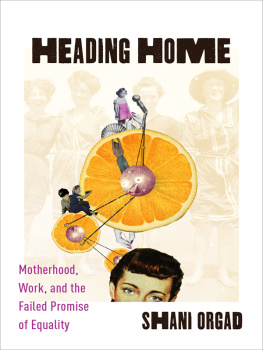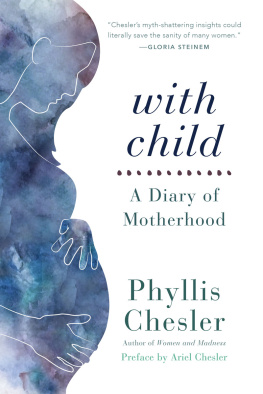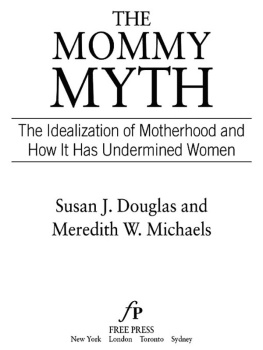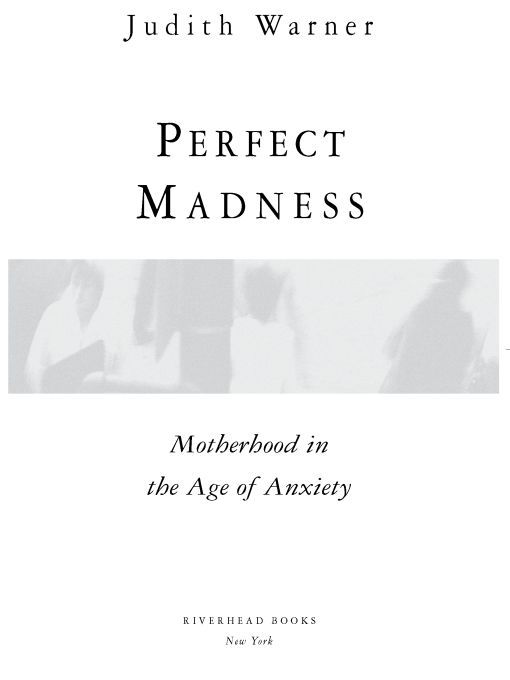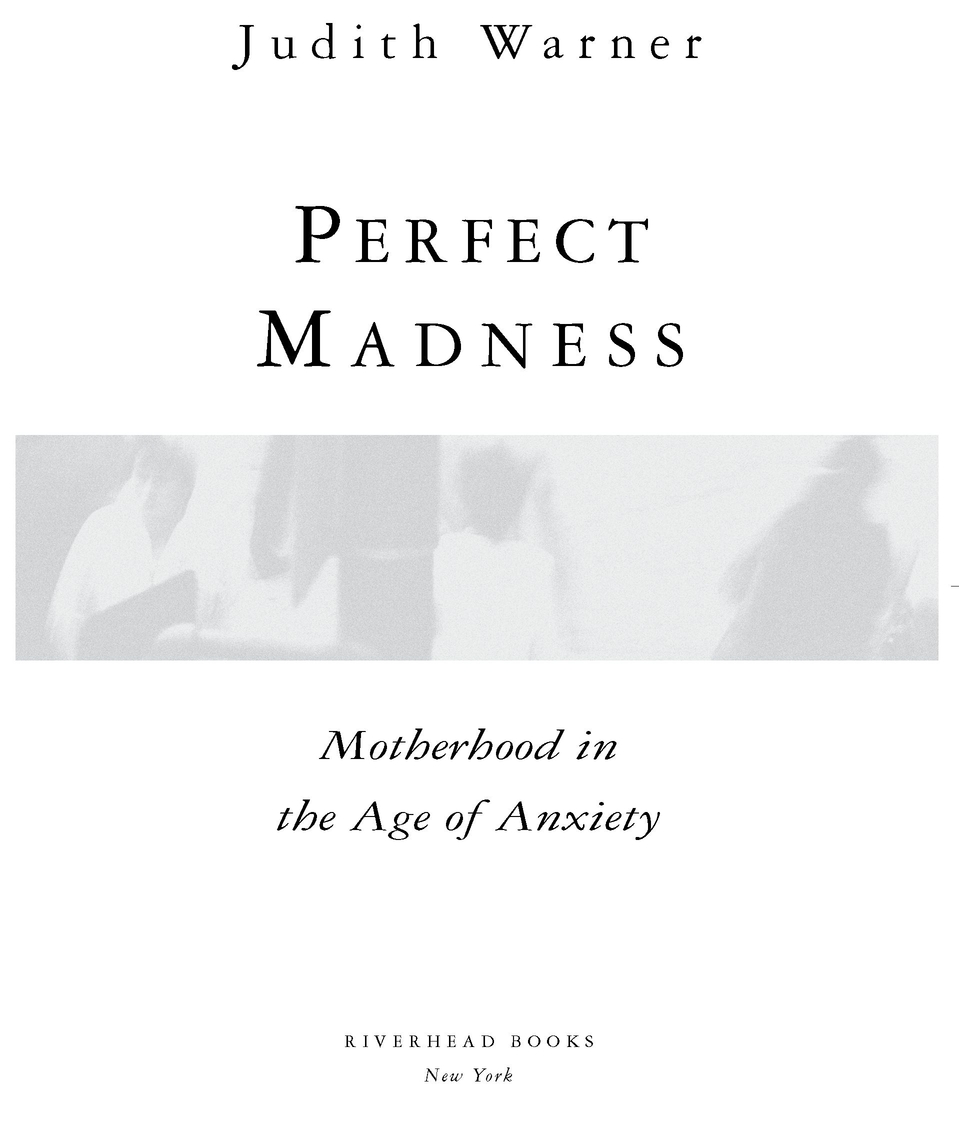Table of Contents
Praise for Judith Warners PERFECT MADNESS
In the end [Warner] arrives at the controversial conclusion that mothers are not victims of outside forces but rather their own worst enemies. The bigger issue, Ms. Warner argues, is that whether working or not, moms are consumed by what she sees as a new soul-draining perfectionism thats turned parentingfrom the first ultrasound to the last college applicationinto a competitive sport. Ms. Warners observations inject new life into what has become a long, tired debate.
The New York Observer
In this polemic about contemporary motherhood, Warner argues that the gains of feminism are no match for the frenzied perfectionism of American parenting. In the absence of any meaningful health, child- care, or educational provisions, martyrdom appears to be the only feasible model for successful maternitywith destructive consequences for both mothers and children. Comparing this situation with her experiences of child-rearing in France, Warner finds American hyper- parentingpreschool violin and Ritalin on demandjust plain crazy. The trouble is a culture that, though it places enormous private value on children, neglects them in the arenas of public policy. She is concerned less with sexual politics than with the more persuasive effects of the winner take all mentality, and makes an urgent case for more socially integrated parenthood. The New Yorker
Modern motherhood is exacting costs.... With Perfect Madness, Warner convincingly shows the psychological damages.
The Washington Post Book World
[Perfect Madness] has struck a chord among middle-class moms guilt-tripped into being time-martyrs and trying to micromanage their childrens lives. People
A sharply observed study of motherhood in todays culture.
The Atlanta Journal-Constitution
Warner argues for a saner society, where everyone would have access to a decent living and enough family time for themselves and their children.
Publishers Weekly
[Judith Warners] words have struck a nerve with modern mothers.
The Richmond Times-Dispatch
Warner has... inspired the beginnings of debate about where neurotic motherhood leads. The Observer (London)
Perfect Madness is the utter madness of life in a frenzy around the children. But it also hints at the madness that is inherent in womens attempts to be perfect mothers and have perfect children. As a result, they give up everything that distinguished them as individual womenwith a variety of wishes, desires, and interestsbefore they became mothers. HaAretz (Israel)
ALSO BY JUDITH WARNER
Hillary Clinton: The Inside Story
Newt Gingrich: Speaker to America
(by Judith Warner and Max Berley)
In and Out of Vogue
(by Grace Mirabella with Judith Warner)
You Have the Power: How to Take Back Our Country
and Restore Democracy in America
(by Howard Dean with Judith Warner)
To my mother
Who fed me Yodels and Chef Boy-Ar-Dee
Who let me drink coffee (but Gatorade, never)
Who laughed with me until the tears rolled down our faces
And whose love and support never end.
And to Max, Julia, and Emilie
In gratitude, and with all my love
Foreword
FOR A long time, the book that is now Perfect Madness was a mass of file folders and yellow legal pads that I carried around in an old briefcase from home, up the stairs to the Georgetown University library, back to my car, to my local coffeehouse, to my daughters schools, and to the gym. There were days when I pulled every muscle in my back and didnt write a single salvageable word; other days, I scribbled furiously from my corner of the playground to the last acceptable remaining seconds of pick-up time. Once, Im ashamed to admit, I worked my way out of a week-long writing block with a notebook resting on my steering wheel, scrawling with my right hand while I steered with my left.
For almost three years, this was my life. The seasons changed outside the picture windows of the reading room overlooking the Potomac, and the first seven chapters came together. My friend Jessica and I shared a student-worn table, passing six-packs of caramel creams back and forth as I twisted around in my seat, trying to wrestle the shapeless anxiety of chapter eight into some kind of coherent form. I wrote the conclusion on the floor of my home office, surrounded by the materials Id used to fact-check the Introduction: my 1997 copy of Paris des Tout-Petits, a bunch of brochures from our local mairie, and notes from a conversation with the director of my elder daughters first preschool. I revisited in my mind the hidden cobble-stone passage off the rue Oudinot that led past a row of tiny, English cottage-style houses to the school, and I saw again in my mind my then-two-year-old daughter, with her ponytails and Babar backpack and strangely old-fashioned brown lace-up shoes.
I wrote the last lines of the book:
I always knew that, despite all the comforts of our life in France, I wanted my children to grow up in America. Because I wanted them to tap into my countrys energy and forward-looking self-propulsion. And because I wanted them to be American womenas I imagined them, as I dreamed them, to be.
... I tell my girls this (in so many words) all the time.... I hope [they] will never say that I lied to them. I hope they, too, will grow up believing in that most American of dreams. And that society will come together to make it a reality.
It never should have come as a surprise to me that the reaction to Perfect Madness has been so very personal. After all, this is, as I say in the original Preface, a highly personal book. It is personal not just because it weaves together research and interviews with my own life experiences. Its personal becauseto an extent far beyond anything else Ive ever writtenit is infused with me. It sounds like me. It suffers from all my expressive proclivities. (Endless italics. Exclamation points! And, of course, sentence fragments and parentheses.) Its hyperbolic, opinionated, breathless, prejudiced, Pollyanna-ishexactly as I am, exactly as youd encounter me, if you were to come across me, say, at a Washington Sunday brunch where, as tends to happen at Washington Sunday brunches, everyone is bloviating about his or her own area of specialty.
You know how it is at these kinds of brunches. There are people you like, and people you just cant stand. People who make you laugh, and people who grate on your nerves. So it has been with this book.
A certain number of people love it. They read it out loud to their husbands (or, conversely, their wives). They give it to their sisters, their daughters-in-law, and their friends. They say the book makes them feel validated and relieved. They say it reads like entries from their own journals. Some say they feel it has given them permission simply to be themselves.
Other people hate the book. They hate its premise. They hate its tone. They think its whiny and self-indulgent and judgmental. The madness I write about, they say, is chiefly my own neuroses. Try a little attitude adjustment, they say, and things like the New Problem That Has No Name will simply go away.









